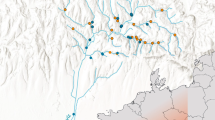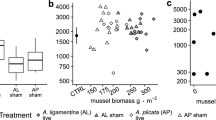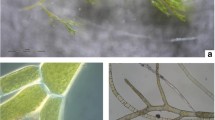Abstract
Eighty-three infrageneric taxa of stream macroalgae have been reported from tundra regions of North America, composed of 32 cyanobacteria, 35 Chlorophyta, 10 Chrysophyta and 6 Rhodophyta. There are few if any endemics represented in this flora. The most widespread species are the cyanobacteria Rivularia minutula, Nostoc commune and Tolypothrix tenuis as well as asexual populations of the chlorophyte genus Zygnema. The relative contribution of cyanobacteria compared to that of the Chlorophyta increases from the low to high arctic. Number of species per segment ranges from 0 to 7, with a mean of 2.8, and varies little between the low and high arctic. The percentage of stream bottom covered by macroalgae ranges from 0 to ca. 75%; mean cover values for low and high arctic streams are ca. 12 and 8%, respectively. Tundra macroalgae tend to be more abundant and diverse in less rigorously flowing stream sections. Most species tolerate prolonged freezing by forming resistant vegetative cells with thick walls, plentiful reserves and low molecular weight solutes to lower the freezing point. Many tundra stream macroalgae also produce ‘sunscreen’ pigments to reduce exposure to damaging radiation in the blue and ultraviolet regions. Nutrients tend to be low and phosphorus is often limiting in these systems. Arctic streams appear to differ from those of Antarctica in having potential grazers of macroalgae, such as the chironomid Diamesa, the mayfly Baetis and the caddisfly Brachycentrus.
Similar content being viewed by others
References
Alvarez, M., T. Gallardo, M. A. Ribera & Gómez Garetta, 1988. A reassessment of North Atlantic seaweed biogeography. Phycologia 27: 221–233.
Bachmann, H., 1921. Beträge zur Algenflora des Süßwassers von Westgrönland. Mitt. Naturforsch. Ges. Luzern 8: 1–181.
Bliss, L. C., 1988. Arctic tundra and polar desert biome. In M. G. Barbour & W. D. Billings (eds), North American Terrestrial Vegetation. Cambridge University Press, Cambridge: 1–32.
Bowden, W. B., B. J. Peterson, J. C. Finlay & J. Tucker, 1992. Epilithic chlorophyll a, photosynthesis, and respiration in control and fertilized reaches of a tundra stream. Hydrobiologia 240: 121–131.
Bowden, W. B., J. C. Finlay & P. E. Maloney, 1994. Long-term effects of PO4 fertilization on the distribution of bryophytes in an arctic river. Freshwat. Biol. 32: 445–454.
Broady, P. A., 1982. Taxonomy and ecology of algae in a freshwater stream in Taylor Valley, Victoria Land, Antarctica. Arch. Hydrobiol. Suppl. 63, 3: 331–349.
Broady, P. A., 1989. The distribution of Prasiola calophylla (Carmich.) Menegh. (Chlorophyta) in Antarctic freshwater and terrestrial habitats. Antarctic Sci. 1: 109–118.
Craig, P. C. & P. J. McCart, 1975. Classification of stream types in Beaufort Sea drainages between Prudhoe Bay, Alaska, and the Mackenzie Delta, N.W.T., Canada. Arctic Alpine Res. 7: 183–198.
Crippen, R. W. & J. L. Perrier, 1974. The use of neutral red and Evan's blue for live-dead determinations of marine plankton. Stain Technol. 49: 97–104.
Croasdale, H., 1973. Freshwater algae of Ellesmere Island, N.W.T. National Museums of Canada. Publications in Botany No. 3, Ottawa, 131 pp.
Davey, M. C., 1989. The effects of freezing and desiccation on photosynthesis and survival of terrestrial Antarctic algae and cyanobacteria. Polar Biol. 10: 29–36.
Davey, M. C. & K. J. Clarke, 1992. Fine structure of a terrestrial cyanobacterial mat from Antarctica. J. Phycol. 28: 199–202.
Douglas, M. S. V. & J. P. Stool, 1993. Freshwater diatoms from high arctic ponds (Cape Hershel, Ellesmere Island, N.W.T.). Nova Hedwigia 57: 511–552.
Douglas, M. S. V., J. P. Stool & W. Blake Jr., 1994. Marked post — 18th century environmental change in high-arctic ecosystems. Science 266: 416–419.
Garcia-Pichel, F. & R. W. Castenholz, 1991. Characterization and biochemical implications of scytonemin, a cyanobacteria sheath pigment. J. Phycol. 27: 395–409.
Guy, C. L., 1990. Cold acclimation and freezing tolerance: role of protein metabolism. Annu. Rev. Plant Physiol. Plant Mol. Biol. 41: 187–223.
Hambrook, J. A. & R. G. Sheath, 1987. Grazing of freshwater Rhodophyta. J. Phycol. 23: 656–662.
Hambrook, J. A. & R. G. Sheath, 1991. Reproductive ecology of the freshwater red alga Batrachospermum boryanum Sirodot in a temperate headwater stream. Hydrobiologia 218: 233–246.
Hamilton, P. B. & S. A. Edlund, 1994. Occurrence of Prasiola fluviatilis (Chlorophyta) on Ellesmere Island in the Canadian arctic. J. Phycol. 30: 217–221.
Harper, P. P., 1981. Ecology of streams at high latitudes. In M. A. Lock & D. D. Williams (eds), Perspectives in Running Water Ecology, Plenum Press, New York: 313–337.
Hart, D. D., 1983. The importance of competitive interactions within stream populations and communities. In J. R. Barnes & G. W. Minshall (eds), Stream Ecology, Application and Testing of General Ecological Theories, Plenum Press, New York: 99–136.
Hawes, I., 1989. Filamentous green algae in freshwater streams in Signy Islands, Antarctica. Hydrobiologia 172: 1–18.
Hawes, I., 1990. Effects of freezing and thawing on a species of Zygnema (Chlorophyta) from the Antarctic. Phycologia 29: 326–331.
Hebert, P. D. N. & D. B. McWalter, 1983. Cuticular pigmentation in arctic Daphnia: adaptive diversification of asexual lineages? Am. Nat. 122: 286–291.
Hershey, A. E. & A. L. Hiltner, 1988. Effect of a caddisfly on black fly density: interspecific interactions limit black flies in an arctic river. J. N. Am. Benthol. Soc. 7: 188–196.
Howard-Williams, C. & W. F. Vincent, 1989. Microbial communities in southern Victoria Land streams (Antarctica) I. Photosynthesis. Hydrobiologia 172: 27–38.
Hullar, M. A. & R. Vestal, 1989. The effects of nutrient limitation and stream discharge on the epilithic microbial community in an oligotrophic Arctic stream. Hydrobiologia 172: 19–26.
Jensen, T. E., 1985. Cell inclusions in the cyanobacteria. Arch. Hydrobiol. Suppl. 21(1/2): 33–73.
Johansson, C., 1980. Attached algal vegetation in some streams from the Narssaq area South Greenland. Acta Phytogeogr. Suec. 68: 89–96.
Kobayashi, Y., 1967. Prasiola crispa and its allies in the Alaskan arctic and Antarctica. Bull. Nat. Sci. Mus. Tokyo 10: 211–220, 2 pls.
Miller, M. C., P. DeOliveira & G. G. Gibeau, 1992. Epilithic diatom community response to years of PO4 fertilization: Kuparuk River, Alaska (68 N Lat.). Hydrobiologia 240: 103–119.
Milner, A. M. & G. E. Pelts, 1994. Glacial rivers: physical habitat and ecology. Freshwat. Biol. 32: 295–307.
Moore, J. W., 1974. Benthic algae of southern Baffin Island III. Epilithic and epiphytic communities. J. Phycol. 10: 456–462.
Moore, J. W., 1979. Distribution and abundance of attached, littoral algae in 21 lakes and streams in the Northwest Territories. Can. J. Bot. 57: 568–577.
Morison, M. O. & R. G. Sheath, 1985. Responses to desiccation stress by Klebsormidium rivulare (Ulotrichales, Chlorophyta) from a Rhode Island stream. Phycologia 24: 129–145.
Murray, J. L. & J. Svoboda, 1989. Available nitrogen and phosphorus content in streams feeding wet sedge meadows at Sverdrup Pass, Ellesemere Island, N.W.T. Musk-Ox 37: 54–59.
Pandey, K. D., A. K. Kashyap & R. K. Gupta, 1992. Nitrogen fixation by cyanobacteria associated with moss communities in Schirmacher Oasis, Antarctica. Israel J. Bot. 41: 187–198.
Patrick, R. A., 1988. Importance of diversity in the functioning and structure of riverine communities. Limnol. Oceanogr. 33: 1304–1307.
Petersen, J. B., 1924. Freshwater-algae from the north-coast of Greenland collected by the late Dr. Th. Wulff. Den. II. Thule Ekspedition til Grønlands Nordkyst 1916–18. Nr. 13. XIII. Medd. Grønland 64: 305–319.
Peterson, B. J., L. Deegan, J. Helfrich, J. E. Hobbie, T. E. Ford, A. Hershey, A. Hiltner, G. Kipphut, M. A. Lock, D. M. Fiebig, M. C. Miller, J. R. Vestal, R. Ventullo & G. Volk, 1993. Biological responses of a tundra river to fertilization. Ecology 74: 653–672.
Peterson, B. J., J. E. Hobbie, A. E. Hershey, M. A. Lock, T. E. Ford, J. R. Vestal, V. L. McKinley, M. A. J. Hullar, M. C. Miller, R. M. Ventullo & G. S. Volk, 1985. Transformation of a tundra river from heterotrophy to autotrophy by addition of phosphorus. Science 229: 1383–1386.
Peterson, C. G. & R. J. Stevenson, 1992. Resistance and resilience of lotic algal communities: importance of disturbance and current. Ecology 73: 1445–1461.
Prescott, G. W., 1963. Ecology of Alaskan freshwater algae. II. Introduction: general considerations. Trans. Am. Microsc. Soc. 82: 83–142.
Rydén, B. E., 1977. Hydrology of Truelove Lowland. In L. C. Bliss (ed.), Truelove Lowland, Devon Island, Canada. University of Alberta Press, Edmonton: 107–136.
Rydén, B. E., 1981. Hydrology of northern tundra. In L. C. Bliss, O. W. Heal & J. J. Moore (eds), Tundra ecosystems: a comparative analysis. Cambridge University Press, Cambridge: 115–137.
Sheath, R. G. & K. M. Cole, 1992. Biogeography of stream macroalgae in North America. J. Phycol. 28: 448–460.
Sheath, R. G. & J. A. Hambrook, 1990. Freshwater ecology. In K. M. Cole & R. G. Sheath (eds), Biology of the Red Algae. Cambridge University Press, Cambridge: 423–453.
Sheath, R. G. & A. D. Steinman, 1982. A checklist of freshwater algae of the Northwest Territories, Canada. Can. J. Bot. 60: 1964–1997.
Sheath, R. G. & A. Whittick, 1995. The unique gonimoblast propagules of Batrachospermum breutelii (Batrachospermales, Rhodophyta). Phycologia 34: 33–38.
Slack, K. V., J. W. Nauman & L. J. Tilley, 1979. Benthic invertebrates in a north-flowing stream and a south-flowing stream, Brooks Range, Alaska. Wat. Res. Bull. 15: 108–135.
Stockner, Z. S. J. & H. B. N. Hynes, 1976. Studies on the tributaries of Char Lake, Cornwallis Island, Canada. Hydrobiologia 49: 97–102.
Stonehouse, B., 1989. Polar Ecology. Chapman & Hall, New York, 222 pp.
Vankat, J. L., 1979. The Natural Vegetation of North America. An Introduction. John Wiley & Sons, New York, 261 pp.
Vincent, W. F., M. T. Downes, R. W. Castenholz & C. Howard-Williams, 1993a. Community structure and pigment organization of cyanobacteria-dominated microbial mats in Antarctica. Eur. J. Phycol. 28: 213–221.
Vincent, W. F. & C. Howard-Williams, 1986. Antarctic stream ecosystems: physiological ecology of a blue-green algal epilithon. Freshwat. Biol. 16: 219–233.
Vincent, W. F., C. Howard-Williams & P. A. Broady, 1993b. Microbial communities and processes in Antarctic flowing waters. In Antarctic Microbiology, Wiley-Liss: 543–569.
Vincent, W. F. & S. Roy, 1993. Solar ultraviolet-B radiation and aquatic primary production: damage, protection, and recover. Envir. Rev. 1: 1–12.
Whitton, B. A., 1992. Diversity, ecology, and taxonomy of the cyanobacteria. In N. H. Mann & N. G. Carr (eds), Photosynthetic Prokaryotes. Plenum Press, New York: 1–51.
Woo, M.-K., 1988. Wetland runoff regime in northern Canada. In K. Senneset (ed.), Permafrost. Fifth International Conference Proceedings Vol. 1, Tapir Publishers, Trondheim: 644–649.
Woo, M.-K., 1991. Arctic streamflow. In M.-K. Woo & D. J. Gregor (eds), Arctic Environment: Past, Present & Future. Dept. of Geography, McMaster University, Hamilton: 105–111.
Yamagishi, T., 1967. Some filamentous Chlorophyceae in the Alaskan arctic. Bull. Nat. Mus. Tokyo 10: 201–206, 2 pl.
Author information
Authors and Affiliations
Rights and permissions
About this article
Cite this article
Sheath, R.G., Vis, M.L., Hambrook, J.A. et al. 7. Tundra stream macroalgae of North America: composition, distribution and physiological adaptations. Hydrobiologia 336, 67–82 (1996). https://doi.org/10.1007/BF00010820
Issue Date:
DOI: https://doi.org/10.1007/BF00010820




